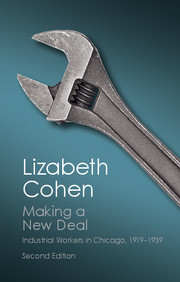Book contents
- Frontmatter
- Dedication
- Contents
- List of Illustrations
- List of Tables
- Acknowledgments
- Preface to the Second Edition
- Making a New Deal: Second Edition
- Introduction
- 1 Living and Working in Chicago in 1919
- 2 Ethnicity in the New Era
- 3 Encountering Mass Culture
- 4 Contested Loyalty at the Workplace
- 5 Adrift in the Great Depression
- 6 Workers Make a New Deal
- 7 Becoming a Union Rank and File
- 8 Workers' Common Ground
- Conclusion
- Notes
- Index
8 - Workers' Common Ground
from Making a New Deal: Second Edition
Published online by Cambridge University Press: 05 October 2014
- Frontmatter
- Dedication
- Contents
- List of Illustrations
- List of Tables
- Acknowledgments
- Preface to the Second Edition
- Making a New Deal: Second Edition
- Introduction
- 1 Living and Working in Chicago in 1919
- 2 Ethnicity in the New Era
- 3 Encountering Mass Culture
- 4 Contested Loyalty at the Workplace
- 5 Adrift in the Great Depression
- 6 Workers Make a New Deal
- 7 Becoming a Union Rank and File
- 8 Workers' Common Ground
- Conclusion
- Notes
- Index
Summary
Rank-and-file workers' success in organizing unions during the 1930s reflected more than common lessons learned on the training grounds of welfare capitalism and the Great Depression. Even more fundamentally, those who worked in Chicago's factories had come to share a similar cultural life that helped them unite against their bosses as they fought for a union. In the World War I period, workers' disunity, particularly along skill, racial, and ethnic lines, had contributed to their defeat. Employers played one group against another while workers lacked ways of transcending the cultural isolation that kept them apart. By the mid-1930s, however, workers, whatever their skill and whether born of immigrant or native parents, white or black, simply had more in common on which a united union movement could be built. Most crucially, the CIO, recognizing the importance of a shared culture to the organizing process, reinforced workers' new common ground with a deliberate cultural strategy, the construction of what I call a CIO “culture of unity.”
Skill divided manufacturing workers less and less over the course of the twenties and thirties. Workers' decision to restrict their output during the welfare capitalism of the 1920s and the speed-ups of the 1930s had taught them to cooperate better on the shop floor, often across skill lines.
- Type
- Chapter
- Information
- Making a New DealIndustrial Workers in Chicago, 1919–1939, pp. 323 - 360Publisher: Cambridge University PressPrint publication year: 2014



